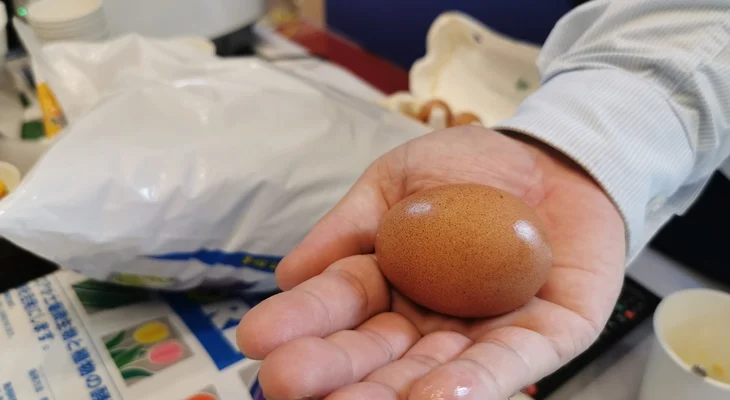Content available at: Tiếng Việt (Vietnamese)
Two products, including what has been recognized by Belgium as the ‘world’s best-tasting eggs’, took centerstage at the 6th Global Vietnamese Young Intellectuals Forum held on July 20 in Hanoi.
Dinh Hung Cuong, Head of R&D at the Fukoda Institute of Marine Chemistry (Japan), brought the eggs to the forum, along with a premium rice variety served only in high-end restaurants and hotels in Japan.
Dr Dinh Hung Cuong speaking at the 6th Global Vietnamese Young Intellectuals Forum. Photo: Tuoi Tre.
Both products are organically farmed, using ionized fertilizers and feed to optimize nutrient absorption while minimizing environmental residue—marking a shift from conventional chemical methods.
Dr Cuong had previously tested this ionization technology on coffee plants in Dak Lak, Vietnam, resulting in coffee beans rich in flavor and nutrients.
However, he noted a major challenge. Much of Vietnam’s farmland has been degraded by chemical fertilizers and now requires years of rehabilitation or the development of an adapted version of the technology.
His purpose in sharing these products at the forum was not commercial promotion, but to inspire ideas for clean and sustainable agriculture.
To illustrate market potential, he cited Japanese mangoes priced at over USD 95/fruit. Their value lies not only in taste, but in organic standards and effective marketing.
Meanwhile, Vietnamese mangoes are just as delicious, yet remain undervalued due to the lack of branding strategies.
Removing barriers, promoting green credit access
The forum’s discussion on green agriculture moved beyond technology and into policy challenges.
Dr Cuong shared that although his ionized fertilizer had passed testing, it has yet to receive trademark protection in Vietnam—despite completing the necessary procedures.
Other young delegates also pointed out that complicated and prolonged administrative processes hinder the commercialization of scientific research.
Many scientific projects praised internationally still face significant difficulties when applied locally.
Meanwhile, clean and organic products remain disadvantaged. They cost more to produce, yield less, and struggle to reach consumers.
Enterprises seeking to invest in green economy initiatives also face financing issues. Existing credit systems rely mainly on collateral assets, credit scores, and projected profitability, leaving little room for sustainability-focused ventures.
To address these issues, delegates proposed:
- Introducing a green credit scoring system based on environmental sustainability,
- Granting easier funding access to businesses with higher “green” scores; and
- Using these policies to encourage clean production and level the playing field for eco-friendly enterprises.

